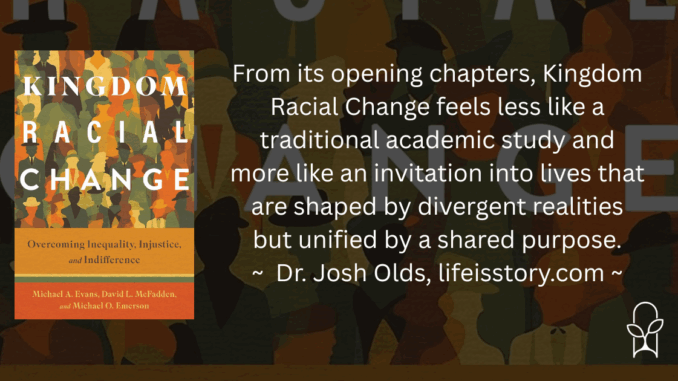
Published by Eerdmans on June 10, 2025
Genres: Non-Fiction, Christian Life, Memoir, Racial Reconciliation
Buy on Amazon
Goodreads

A compelling call to action that weaves together powerful personal stories and keen sociological analysis
In this remarkable book, authors Michael Evans, David McFadden, and Michael Emerson combine personal narratives and sociological research to teach Christians how to work together for racial justice.
The authors begin by sharing their stories. Michael Evans and David McFadden—friends since grade school—are Black and grew up in the rough neighborhoods of Chicago’s south side. Michael is a pastor and has ministered in the very neighborhoods where he was raised; David is a medical doctor. The third author—Michael Emerson, who is white—grew up in white communities that were close geographically to his coauthors’ neighborhoods, but a world away socially.
The authors then interpret their experiences through the lens of sociology, drawing on research to explain how injustice can exist on multiple levels. The micro level consists of individuals, relationships, and families; the meso level comprises organizations such as churches and collective activities such as social movements; and the macro level encompasses entire institutions such as the criminal justice system or the educational system, as well as laws and policies. The authors offer practical strategies for pursuing racial justice on all three levels—strategies designed to overcome inequality and draw Christians from diverse backgrounds and circumstances together in the family of God. A compelling call to action, Kingdom Racial Change will engage the hearts and minds of Christians seeking racial righteousness and reconciliation.
From its opening chapters, Kingdom Racial Change feels less like a traditional academic study and more like an invitation into lives that are shaped by divergent realities but unified by a shared purpose. Michael Evans and David McFadden—friends since childhood in Chicago’s South Side—bring the experience and testimony of the Black community in America. Michael Emerson, a white sociologist raised just blocks away yet worlds apart in the suburbs, serves as a professional and outside perspective, analyzing the broader systems that underpin their stories.
In part one, “Telling the Stories amid National and Local Realities,” the authors weave vivid personal narratives. Evans recounts his journey pastoral leadership. McFadden’s path leads from community hardship to medical practice and ministry. Emerson reflects on privilege and distance amid proximity to racial inequity. These stories offer personal depth to the book and serve as a lens into structural injustice—revealing disparities in housing, education, health, opportunity, and more that was going on during the late-twentieth century.
As the narratives unfold, the authors introduce their eleven Building Blocks of Kingdom Racial Change. I don’t normally do this in a review, but I think they bear listing here because they are the heart of what Kingdom Racial Change looks like:
- The mighty arm of racial power is that it is systemic.
- Every single one of us occupies a social location.
- We must understand Black advantages just as much as white advantages.
- Churches must name and uproot the “Religion of Whiteness”.
- We must work to create healthy environments in childhood.
- We must break the link between race and class.
- Christians can reshape the structure of networks and connections.
- When positioned to help across racial lines, we must act.
- Cross-racial relationships are essential for kingdom racial change.
- We must directly address injustices among God’s people.
- Social change often emerges through community movements.
These building blocks anchor the second part, “Making Kingdom Racial Change,” where the book shifts from narrative to praxis. Macro‑Level change urges bold systemic reform—laws, policies, and institutions require transformation to dismantle racial inequality. Meso‑Level change explores churches, networks, schools, and movements—the communal arenas where transformation gains traction. Micro‑Level change is grounded in daily relationships—family, friendship, neighborly love—as an expression of sacrificial obedience and mutual flourishing.
What makes Kingdom Racial Change compelling is its integration of heart and mind. The voices of Evans and McFadden bring emotional urgency. Emerson’s sociological insight gives analytical weight. And together they frame storytelling and data within a theologically rooted, evangelical Christian ethic. The result is a vision of racial justice deeply spiritual, intimately relational, and pragmatically actionable.
